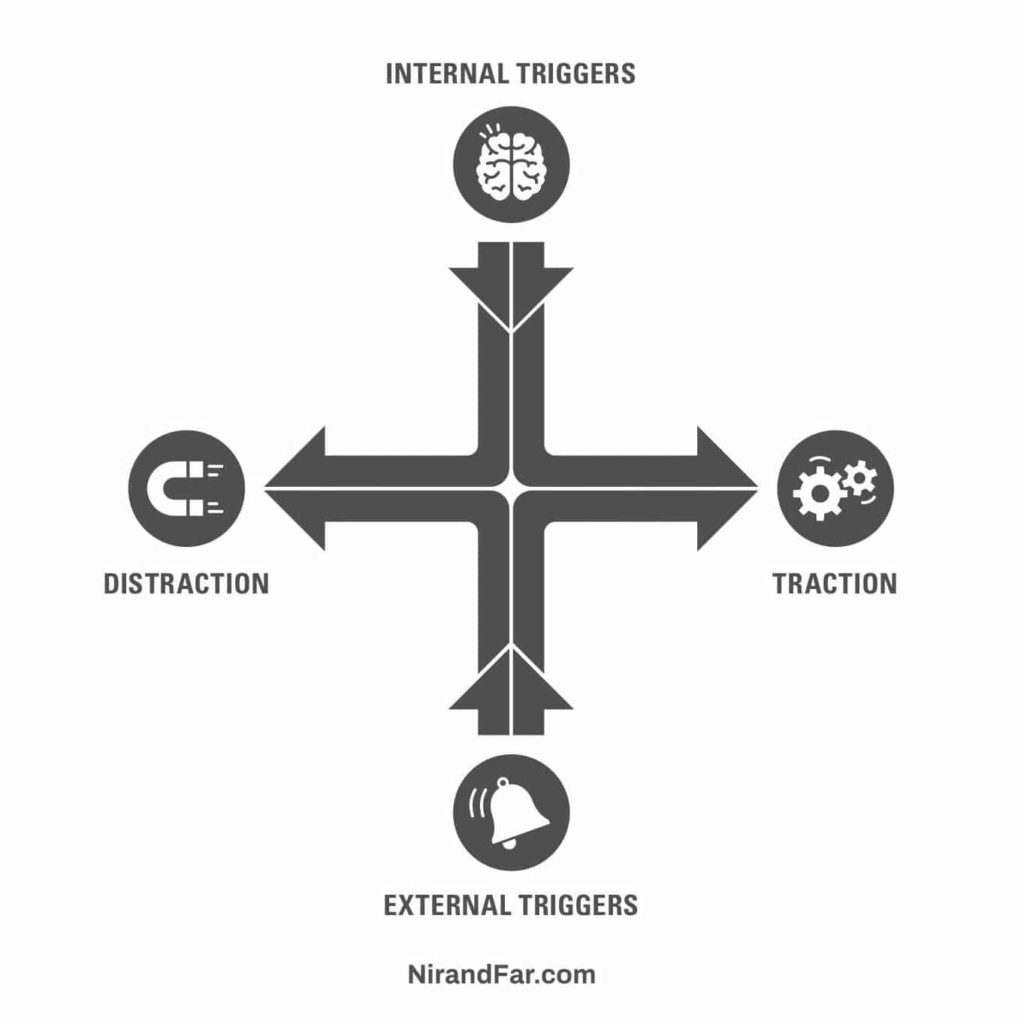I can’t focus. Why?
You’re Stuck in an Unhealthy Rut
In a University College London study, participants were asked to sit at a computer and direct a cloud of dots.3Nobuhiro Hagura, “Humans Are Hard-wired to Follow the Path of Least Resistance,” Science Direct, February 21, 2017, https://www.sciencedaily.com/releases/2017/02/170221101016.htm. They were instructed to move a lever to the right if a dot cloud was moving right and to the left if a dot cloud was moving left. Participants did this with accuracy. That is, until researchers added a weight to one side of the lever making it harder to move one way. The result? Participants began moving the lever in the wrong, yet easier, direction. As the task became more difficult, participants subconsciously changed how they played the game. This study supports research from evolutionary biologists who argue humans have evolved to avoid energy consuming tasks by taking the path of least resistance.4Luke Strotz et al., “Metabolic Rates, Climate and Macroevolution: A Case Study Using Neogene Molluscs,” Proceedings of the Royal Society B: Biological Sciences, August 22, 2018, … Continue reading Doing what we know we should do is often hard. If we fall into a routine of avoiding discomfort by taking too many breaks, we learn it’s easier to break our focus than do what we know we should. As the dot study shows, we quickly learn how to avoid discomfort by changing the game. Henry Ford said, “Thinking is the hardest work there is, which is probably the reason so few engage in it.” If checking email for a quick minute takes the pressure off having to think through a big assignment at work, you’ll keep clicking away if you don’t have the tools to realize and deal with the difficulty. If you don’t change your ways, you’ll soon carve a mental rut that teaches your brain to automatically escape hard work instead of working through it.You Don’t Know How to Focus on Things You Dislike
If you like doing something, you are more likely to do it. If you enjoy shopping for instance, you’ll seek out opportunities for “retail therapy.” However, if you find shopping to be a burden, you will avoid it unless absolutely necessary. Unfortunately, many things you need to do in life aren’t particularly enjoyable. Few people enjoy doing their taxes, but they need to get it done nonetheless. When you don’t enjoy a task, you’re more likely to seek an escape and lose focus. How then, do you stay focused doing something you dislike? Ian Bogost, a professor at Georgia Tech and a professional video game designer, argues that we have the power to reimagine tasks to make them more enjoyable.5Ian Bogost, Play Anything (Washington: Perseus Books Group, 2016). In his book, Play Anything, Bogost challenges readers to tackle everyday tasks with the same discipline and focus used to play a game. Bogost states that we should focus more intensely on the task at hand rather than concentrating on the end result or reward. Bogost highlights this theory using his attempt to make lawn mowing more enjoyable. To learn to enjoy the job of cutting his grass, Bogost focused more intensely on it. He learned everything he could about the practice and challenge himself to find the variability in the activity. For instance, he sought to find the optimal path for cutting the grass or beating his previous time. By reimagining a task, you can make anything more enjoyable and intrinsically rewarding.You’re Telling Yourself You “Don’t Have Time”
In a Monthly Labor Review study, participants who reported working between 65-74 hours a week overestimated their work week by approximately 20 hours.6”Monthly Labor Review,” U.S. Department of Labor 134, no. 6 (June 2011): , https://www.bls.gov/opub/mlr/2011/06/mlr201106.pdf Too often, people confuse being productive with being busy.7Jennifer Cbe ohen, “Busy Vs. Productive: Which One Are You?” Forbes, June 25, 2018, , … Continue reading However, there is evidence to suggest that “being too busy” to work on your goals indicates a lack of focus, not a lack of time. Henry Ford said, “It has been my observation that most people get ahead during the time that others waste.” Everyday, we choose how to spend our time. Wake up early, or hit the snooze? Take that part-time course or leave it for next month? Put clothes away now, or let them pile up? If everyone has the same 24-hours in their day, why are some people able to accomplish so much more? Research shows that the secret to time-management might not such a secret after all. Laura Vanderkam, time management and productivity author, has found that the most productive people are not time management wizards, rather, they are highly skilled at setting priorities.8Laura Vanderkam, TED, 2016, , accessed April 15, 2019, https://www.ted.com/talks/laura_vanderkam_how_to_gain_control_of_your_free_time?language=en#t-274983. Highly productive people have a limited, focused list of what they want to accomplish and allocate time accordingly. She argues that the “I don’t have time excuse” is a passive way of admitting something “is not one of my priorities.”How to Get (and Stay) Focused
Now that you have a clear picture of what causes people to lose focus, it’s time to learn the tools to overcome distraction. Here’s how to make the most out of your time and your life:
Complain Better
Emotional Intelligence 2.0 author, Dr. Travis Bradberry, argues that frequent complaining is a detrimental habit that can – and should – be broken. Complaining releases the stress hormone cortisol which negatively affects mood, reduces energy levels, and can ironically lead to more of the uncomfortable emotions we seek to escape through distractions.10Travis Bradberry, “How Complaining Rewires Your Brain For Negativity,” HuffPost, December 28, 2017, https://www.huffpost.com/entry/how-complaining-rewires-y_n_13634470.
It’s time to learn how to complain better. Instead of complaining by focusing on the problem, Bradberry suggests adopting a “solution-oriented” approach.
Next time you feel the urge to complain about a looming deadline or difficult task, stop to consider the real source of the problem. For instance, ask yourself whether a solution to the problem of not wanting to do a task can be found in changing your perception of the work. If so, changing your mind proves much easier and healthier than trying to avoid it. A little self awareness through introspection can go a long way.
Schedule Your Indulgences
In a 1992 study, researchers found that participants who cited being unable to lose weight despite dieting underestimated their daily caloric intake by 47%.11Nadja Hermann, “I Lost 13 Stone – Now I Know the Truth about Obesity,” The Guardian, January 05, 2019, … Continue reading These same participants overestimated their daily activity level by 51%. This study suggests that we have a tendency to overestimate behaviors we know to be good for us – how much we exercise, how healthy we eat, how often we clean our homes. We do the opposite when it comes to behaviors we know have detrimental effects – alcohol consumption, sugar intake, and monthly entertainment spending.12Andrew Hough, “‘Moderate Drinkers’ Underestimate Alcohol Use by 40 per Cent, Says Health Chief,” The Telegraph, February 07, 2013, … Continue reading While frivolous indulgences are satisfying in the short-term, they tend to move us away from what we really want. An episode of TV can feel relaxing and satisfying. But what happens after one, two, three…? One episode feels good. A whole series can fill you with regret. When it comes to indulgences, there’s nothing wrong with enjoying yourself. However, the key to moderation is intent. By setting aside time for the things likely to distract you, you ensure to control them instead of letting them control you. Instead of watching television or scrolling social media whenever the urge strikes, put that activity on your calendar, just as you would timebox any task. By planning ahead, you give yourself the peace of mind knowing you’ll soon have time for something fun, without being taken off track when you want to stay focused.Master Your Triggers

Triggers prompt both traction and distraction.
Related Articles
- Schedule Maker: a Google Sheet to Plan Your Week
- Habit Tracker Template in Google Sheets
- The Ultimate Core Values List: Your Guide to Personal Growth
- Timeboxing: Why It Works and How to Get Started in 2024
- An Illustrated Guide to the 4 Types of Liars
- Hyperbolic Discounting: Why You Make Terrible Life Choices
- Happiness Hack: This One Ritual Made Me Much Happier
References

